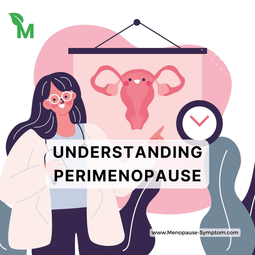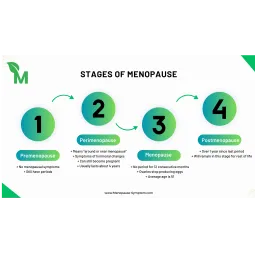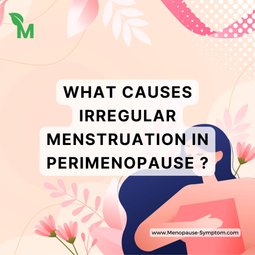Perimenopause Menstruation: Changes, Symptoms And Management Tips
On
28/10/2024Reading time:
5 min
Summary:
Discover how perimenopause affects your menstrual cycle, from irregular periods to hormonal changes. Learn to manage symptoms and understand what's normal during this transitional phase.
Perimenopause menstruation can bring significant changes to your monthly cycle. From irregular periods to heavier flow, understanding these shifts is crucial for managing your reproductive health. Learn about the hormonal fluctuations, common symptoms, and effective strategies to navigate this transitional phase with confidence.
Navigating the Waves of Change: Understanding Perimenopause Menstruation
FAQs
What are the signs of perimenopause affecting menstruation?
How long does perimenopause typically last?
Can perimenopause cause irregular periods?
Is it normal to have heavier periods during perimenopause?
What are the treatment options for perimenopause symptoms?
Can you still get pregnant during perimenopause?
How does perimenopause differ from menopause?
Are there natural remedies for perimenopause symptoms?
When should I see a doctor about perimenopause symptoms?
Does perimenopause affect fertility?
The Shifting Tides of Womanhood
As women, our bodies are constantly evolving, and one of the most significant transitions we face is perimenopause. This natural phase, which typically begins in our 40s, marks the gradual journey towards menopause. During this time, our menstrual cycles can become unpredictable, often leaving us feeling confused and frustrated. But fear not! Understanding perimenopause menstruation is the first step towards embracing this new chapter in our lives.
Decoding Perimenopause Menstruation
The Hormonal Rollercoaster
Perimenopause menstruation is primarily driven by fluctuating hormone levels. As our ovaries begin to produce less estrogen and progesterone, our menstrual cycles can become erratic. This hormonal dance can lead to a variety of changes in our periods, including:
Shorter or longer cycles
Heavier or lighter flow
Skipped periods
Longer lasting periods
It's important to remember that these changes are normal and expected during perimenopause. However, they can still catch us off guard and impact our daily lives.
Recognizing the Signs
While every woman's experience with perimenopause menstruation is unique, there are some common symptoms to watch out for:
Irregular periods: Your once-predictable cycle may become a thing of the past
Heavy bleeding: Some women experience heavier flows during perimenopause
Spotting between periods: Light bleeding between cycles can occur
Shorter menstrual cycles: You might find your periods coming more frequently
Mood swings: Hormonal fluctuations can affect your emotional well-being
"Understanding your body's signals during perimenopause is crucial for maintaining your overall health and well-being."
Managing Perimenopause Menstruation: Your Toolkit for Success
Tracking Your Cycles
One of the most effective ways to manage perimenopause menstruation is by keeping a menstrual diary. This simple practice can help you:
Identify patterns in your cycles
Predict when your next period might arrive
Recognize any concerning changes that may require medical attention
There are numerous apps available that make period tracking easy and convenient. By consistently logging your menstrual data, you'll be better equipped to navigate the unpredictable waters of perimenopause.
Lifestyle Adjustments for Smoother Sailing
Making certain lifestyle changes can significantly improve your perimenopause menstruation experience:
Balanced nutrition: A diet rich in whole grains, fruits, vegetables, and lean proteins can help regulate hormones and reduce symptoms.
Regular exercise: Physical activity can help alleviate mood swings, improve sleep, and boost overall well-being during perimenopause.
Stress management: Practices like meditation, yoga, or deep breathing exercises can help reduce stress, which can exacerbate perimenopause symptoms.
Adequate sleep: Prioritizing good sleep hygiene can help combat fatigue and mood swings associated with perimenopause menstruation.
Exploring Treatment Options
If perimenopause menstruation symptoms are significantly impacting your quality of life, it's worth discussing treatment options with your healthcare provider. Some possibilities include:
Hormonal birth control: This can help regulate cycles and reduce heavy bleeding
Non-hormonal medications: Certain drugs can address specific symptoms like heavy bleeding
Herbal remedies: Some women find relief with natural supplements, though it's important to consult with a healthcare professional before trying any new treatments
Embracing the Change: A Positive Perspective on Perimenopause Menstruation
While perimenopause menstruation can be challenging, it's essential to view this transition as a natural part of our journey as women. This phase offers an opportunity for self-reflection, personal growth, and a deeper understanding of our bodies.
The Power of Knowledge
By educating ourselves about perimenopause menstruation, we can:
Feel more in control of our bodies
Make informed decisions about our health
Support other women going through similar experiences
"Knowledge is power, especially when it comes to understanding and managing perimenopause menstruation."
Building a Support Network
Connecting with other women experiencing perimenopause can be incredibly empowering. Consider:
Joining online forums or support groups
Attending local workshops or classes focused on women's health
Having open conversations with friends and family members
By sharing our experiences and learning from others, we can navigate perimenopause menstruation with greater confidence and ease.
Conclusion: Embracing Your Unique Journey
Perimenopause menstruation is a significant milestone in a woman's life, marking the beginning of a new chapter. While it can bring challenges, it also offers opportunities for growth, self-discovery, and empowerment. By understanding the changes happening in our bodies, implementing effective management strategies, and maintaining a positive outlook, we can navigate this transition with grace and confidence.
Remember, every woman's experience with perimenopause menstruation is unique. What works for one may not work for another. Be patient with yourself, listen to your body, and don't hesitate to seek support when needed. With the right knowledge and tools, you can embrace this natural transition and continue to thrive in all aspects of your life.
As we conclude this exploration of perimenopause menstruation, let's commit to being advocates for our own health and well-being. By staying informed, proactive, and compassionate towards ourselves, we can turn this challenging phase into an opportunity for personal growth and empowerment. Let's celebrate the strength and resilience of our bodies as we navigate this important transition together.
Source: Team MPS compiled, analyzed and wrote. Please dont reup without source of us. Many thanks.




